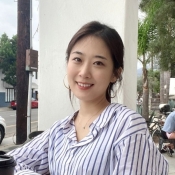As the U.S. Department of Energy calls for researchers to push the boundaries of science to foster energy advancements, Arizona State University's Eileen Seo is exploring a generation of new materials that respond to changes in their environment. These materials, both flexible and composite in nature, are designed to adapt to different conditions, which is crucial for developing innovative energy solutions.
For her work, Seo, a researcher with the Biodesign Center for Sustainable Macromolecular Materials and Manufacturing and an assistant professor of chemical engineering at ASU's School for Engineering of Matter, Transport and Energy, has been honored with an award from the U.S. Department of Energy’s Office of Science Early Career Research Program.
The highly competitive Department of Energry (DOE) Early Career Award supports the development of individual research programs of outstanding scientists early in their careers.
“This prestigious award represents unprecedented convergence of disciplines to tackle the grand challenge of materials sustainability,” says Tim Long, director of the Biodesign Center for Sustainable Macromolecular Materials and Manufacturing. “Professor Seo seamlessly integrates nanotechnology with sustainable polymer design to deliver next-generation energy conversion with light-mediated processes. This vision speaks to our mission for nature-inspired science with light-driven, self-healing materials.”
The DOE has recognized Seo’s highly original project, "Dynamically Switching Polymer Networks Using Transmutable Nanoparticles as Crosslinks," which seeks to enhance the mechanical adaptability of polymers through advanced nanotechnology.
The research is aimed at the creation of eco-friendly materials by developing methods that allow them to heal and adapt at a microscopic level. This ability to self-adjust and repair could lead to longer-lasting materials, thus reducing waste and enhancing sustainability.
Seo’s novel approach promises significant advancements in the fields of bio-inspired mechanics, photoactuators (materials that change shape, move or activate in response to light exposure), and advanced packaging to broaden the applications of sustainable materials technologies.
The latest in materials science research
At the Biodesign Institute, experts are reimagining the building blocks that make up our daily life. Learn more.
“The Early Career Award represents a significant milestone in my research journey, highlighting the significance of this work in nanotechnology and material sustainability and driving meaningful change in the field,” Seo says. “Looking ahead, I aim to broaden this research to address the fundamental challenge of self-repairing polymers and set the stage for integrating other material capabilities for sustainability.”
Before her appointment at ASU in 2021, Seo completed her PhD in chemistry at Northwestern University under the guidance of Chad Mirkin and subsequently conducted postdoctoral research at UC Santa Barbara in the materials department with Craig Hawker. Her exceptional work has received other accolades including the Ralph E. Powe Junior Faculty Enhancement Award and the Engineering for One Planet Fellowship in 2023.
The DOE Early Career Research Program, now in its 14th year, supports research in areas backed by the DOE Office of Science, including biological and environmental research, fusion energy sciences, and advanced scientific computing research. The DOE selected Seo’s project through a rigorous peer review process, which is indicative of ASU’s commitment to fostering innovative research that addresses global challenges.
This award, providing approximately $1 million over five years, will enable Seo and her research team at ASU to push the boundaries of chemical engineering and materials science. Her work exemplifies the synthesis of foundational chemistry and practical application, setting a new standard for sustainable material development and implementation.
More Science and technology

ASU students win big at homeland security design challenge
By Cynthia GerberArizona State University students took home five prizes — including two first-place victories — from this year’s Designing Actionable Solutions for a Secure Homeland student design…

Swarm science: Oral bacteria move in waves to spread and survive
Swarming behaviors appear everywhere in nature — from schools of fish darting in synchrony to locusts sweeping across landscapes in coordinated waves. On winter evenings, just before dusk, hundreds…

Stuck at the airport and we love it #not
Airports don’t bring out the best in people.Ten years ago, Ashwin Rajadesingan was traveling and had that thought. Today, he is an assistant professor at the University of Texas at Austin, but back…



